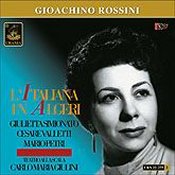By far one of the finest comedies in the operatic repertoire, L’Italiana in Algieri has always played the “little sister” to Rossini’s more famous Il Barbiere di Siviglia, but unlike the “older sister,” L’Italiana had a successful launch, and the proceeds from its 1813 premiere season saved the Teatro San Benedetto from bankruptcy. L’Italiana in Algieri also made its twenty-one year old composer the toast of Venice. The librettist, Angelo Anelli loosely based his drama on the legend of Roxelana, a young Russian girl who in 1523 was captured into slavery by the Turks, and who later, through her guile and intrigue married the Sultan, Suleiman the Magnificent. There is another legend involving a young Italian noblewoman who was captured and sent to a harem in Algiers. The young woman was later set free and returned to Italy to, no less, sing the role of Isabella!
As was the custom in the nineteenth century and before, L’Italiana had previously been set to music by another composer, in this case Luigi Mosca, in 1808.
After a somber but comical beginning symbolizing the Sultan’s omnipresence, the overture which Stendhal considered frivolous, quickly and effectively mixes the love and mad cap themes in the opera, bringing to mind the different characters and situations in the opera.
Mario Pietri in the role of Mustafà sets the tone in the opening scene: a bit gruff, but gentle. His basso voice is well suited for this role, as is his perfect timing and comic mastery. A young Graziela Sciuti in the role of Elvira, delivers a delicate and solid performance as Elvira, the Sultan’s rejected love interest. Her crystal clear soprano shines in the Quintetto of Act 1. Baritone Marcello Cortis delivers a fine performance as the quintessential pompous and elderly suitor, Taddeo; however of all the principals, his is the least interesting rendition.
Of special notice is Cesare Valetti, a key participant in this recording. His Lindoro is expressive and graceful without being weak or affected, and from the start of his opening aria “Languir per una bella,” Valetti’s brilliant lyric voice soars over the orchestra with ease. There is no need for Valetti to worry over other younger singers of today in this role. Many speculate that operas are neglected for lack of female voices to carry the work, but in the case of L’Italiana one would venture to include the lack of tenors like Valetti.
Giulietta Simionato is somewhat limited in her coloratura, but her fluid singing, masterful technique, and elegant phrasing show her as a qualified and adept performer of Rossini’s and early nineteenth century music. In fact, it can be argued that Simionato’s participation in the revival of these early operas paved the way for future generations of singers. A great Dalila, Amneris, Mignon, Carmen and Azucena among others, Simionato is perfectly at ease in lighter roles, having successfully sung a number of comedies before taking on the role of Isabella.
Simionato imbues Isabella’s “Cruda sorte” with the fragility of a lost, bewildered young woman in search of the man she loves—a lullaby in sharp contrast to the subsequent “Qua ci vuol disinvolture” in which Isabella sheds her innocent image to disclose her determination and true intentions. In “Oh! Che muso, che figura!” rather than addressing the listener with mocking intentions, as the aria is often sung, Simionato, very effectively, almost whispers the words to herself, going back to the image of the bewildered young woman, as though she were laughing with, instead of at Mustafà’s unpleasant appearance. Her high notes are never forced, and her chest notes are natural. Likewise, her interpretation of “Per lui che adoro” is lovingly slow and deliberate, leaving one wandering who the recipient of her lament really is—just as intended by Rossini.
The music and story are fast paced, providing the audience with one musical situation after the next, and Giulini conducts with restraint and attention to detail—thus the nuances in the score are never lost or overshadowed by unnecessary embellishments or loudness. Rossini’s melodic invention is evident throughout, as is his superb use of the sound of the language in the riotous finale to Act 1, in which all the characters relate their state of mind to a sound, which the composer parallels to an instrument in the pit. The cast and orchestra are superb in the handling of this situation, capturing the Rossinian genius with an engaging verve, yet never overpowering one another.
Not only is this a delightful opera, overflowing with the composer’s magic, but all the interpreters are in top form, making for a most enjoyable listening experience. Though there are some cuts—few operas were not “cut” throughout the first half of the twentieth century—the recording holds its own against better known, more complete, later versions of Rossini’s masterpiece.
Daniel Pardo
